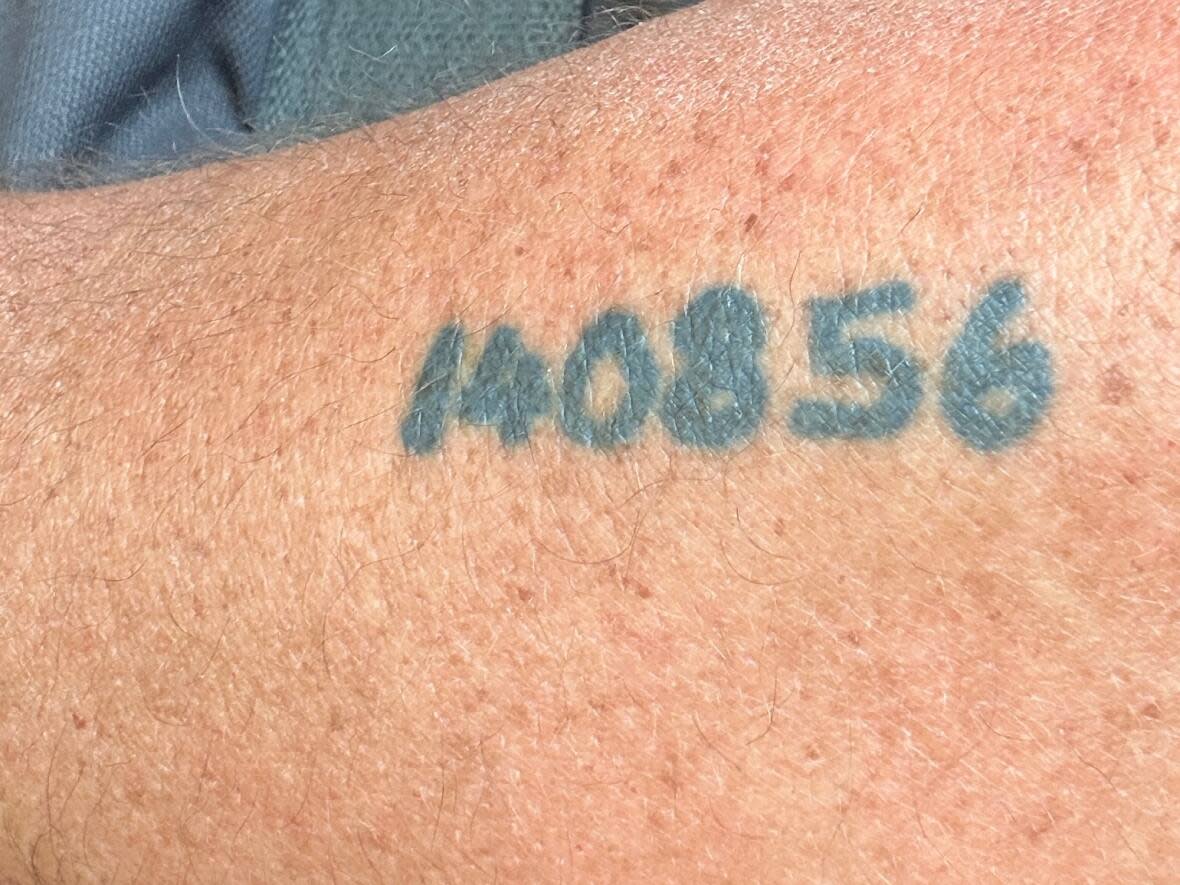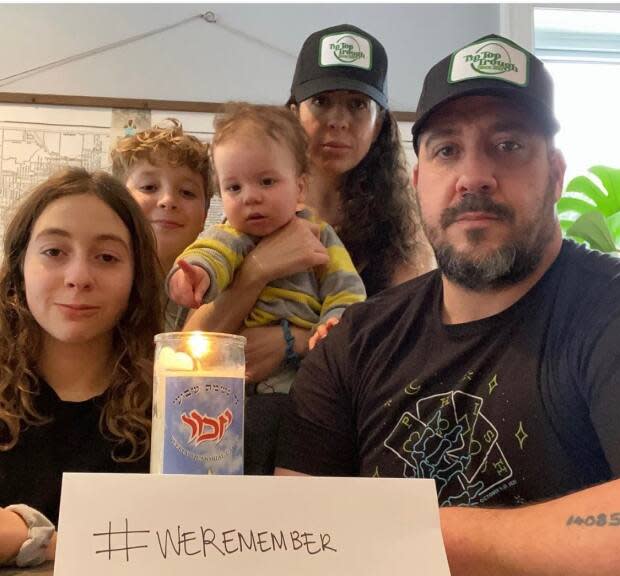In honour of zaide: A Jewish man explains his Holocaust memorial tattoo as part of Ontario study

Tattoos have become more mainstream, but Pierce Goldman admits the memorial Holocaust tattoo he chose to have inked on his left arm has received some scowls from a older Jewish people who don't understand why he did it.
"They don't really know how to react," said Goldman, a Toronto resident.
"It's shocking for them to see a younger man with a number on his arm ... it's not one of those: 'Oh my God, that's an awesome piece of art.' It's meant to be a buzzkill."
The number he refers to — 140856 — was forcibly tattooed onto his grandfather's body when he entered Auschwitz concentration camp during the Second World War.
Goldman said a lot of people ask what it means, which leads to a conversation about his family history.
Researchers at the University of Waterloo are looking to speak to people like Goldman and other descendants of survivors from Nazi concentration camps who have chosen to get a Holocaust tattoo in honour of their ancestors.
Contemporary phenomenon
According to Reisa Klein, a co-researcher with the university's (Re)Marked project, Holocaust memorial tattoos are a contemporary phenomenon she believes started within the last 10 years.
Klein said memorial tattoos have different meanings, depending on the descendant, since they were first given to their ancestors at a concentration camp during the Second World War.
"In the ghettos, Jews were forced to wear the yellow Star of David as a way of demonstrating that they were Jewish and really sequestering them from the youth, the public, and really outing them as Jews as a way of creating a sense of otherness," said Klein.
"Young people today are reappropriating these images that were utilized to dehumanize Jews as a kind of taking it back and as a celebration of Jewish identity."
Klein said tattooing is considered illegal in Judaism, but Goldman said he got his tattoo out of respect for his grandfather.
It's not known how many Jewish Canadians have received memorial tattoos. But Marvin Rotrand, national director of the League for Human Rights at B'Nai Brith Canada, said he's heard of people getting them over the years.
Rotrand said he understands the tattoo is a way for descendants of Holocaust survivors to connect with them and their family history.
"You know, as such, there is no motive of the young people doing this to hurt anyone," said Rotrand.
"Not everybody has to do it. But those who do this, we do not condemn. We recognize that it is their personal choice."
Rotrand said while it's not a widespread movement, he has read over the years of people getting a Holocaust memorial tattoo noting "there's some debate about it in that [particular] community and then it seems to disappear."
Their memory 'lives on'
Goldman said he followed the lead of his brother, Max, in getting a memorial tattoo. He said he was touched by what Max did — a move that brought back a lot of memories about their grandfather, Schmerle Lazer Cynamon.

Cynamon, his wife and their two children were sent to the Auschwitz camp in German-occupied Poland. Of the four of them, he was the only survivor.
"My bubbie and my zaide were both wonderful people," said Pierce.
"My mom passed away last year, her brother the year before that, so their entire family is gone. So, you know, it lives on through my brother and through myself."
Rabbi Moshe Goldman — who's not related to Pierce — is director of the Rohr Chabad Centre for Jewish Life in Waterloo and is the grandson of a Holocaust survivor.
The rabbi said he understands intergenerational trauma being experienced.
"I see this as some sort of processing of all that pain.
"At the same time, you know, I would hope that this doesn't turn into an ongoing generational trend; that the children and the grandchildren of those getting these tattoos feel the need to continue doing that. Ultimately, it's a symbol of oppression."
Rabbi Goldman added the ultimate victory is raising families of "proud Jews who are secure in their identity as Jews and don't feel any shred of oppression or victimhood."
What the (Re)Marked project is about
Susan Cadell, principal investigator with the (Re)Marked project, said besides talking to those who have gotten a memorial tattoo, researchers have a list of questions for anyone who had considered getting one but decided not to in the end.
"We're also super interested in that because we want to know what the significance is, what the thought process is, even if it hasn't resulted in getting the tattoo," said Cadell.
The volunteers will be asked a list of questions, such as:
Why did you choose to get a commemorative tattoo?
What is the significance of the design they chose?
What is the location of the tattoo on their body and why is it placed there?
What impact has the the tattoo had on you?
"We've talked to tattoo artists who won't do certain kinds of tattoos because they're too reminiscent of the Holocaust, like numbers on arms, on forearms and things like that," said Cadell.
"We have had a lot of people who get tattoos to push back at stigma and try to bust stigma of all kinds."
The (Re)Marked Project is not the only work the five researchers from the University of Waterloo have done with tattoos. They launched a website called Stories From The Skin, which highlights personal stories about tattoos people got as part of their healing.
(Re) Marked Project is 'about building relationships with the Jewish community.' - Reisa Klein, University of Waterloo researcher
In 2021, the researchers also hosted an exhibit, called Inking the Bond, at a local Kitchener museum of photos of tattoos meant to honour loved ones who the subjects have lost.
The Holocaust memorial tattoo project is part of "a suite of tattoo projects," Cadell said.
Klein said this particular research project is "really about building relationships with the Jewish community ... it is quite an interesting thing that this is happening specifically at this moment, so we would like to try to understand that and trace that a little bit more, and see if there's social significance in that."
LISTEN | Researchers explain why they're looking for people who got or considered a Holocaust memorial tattoo:


